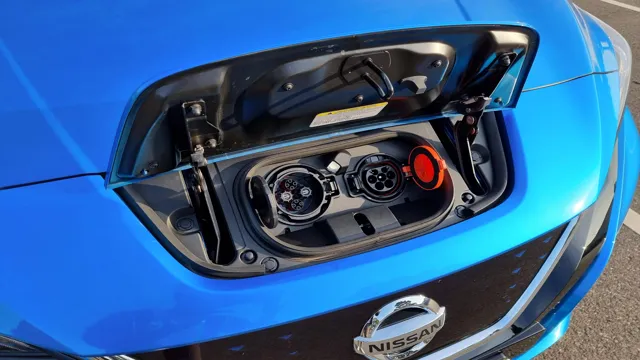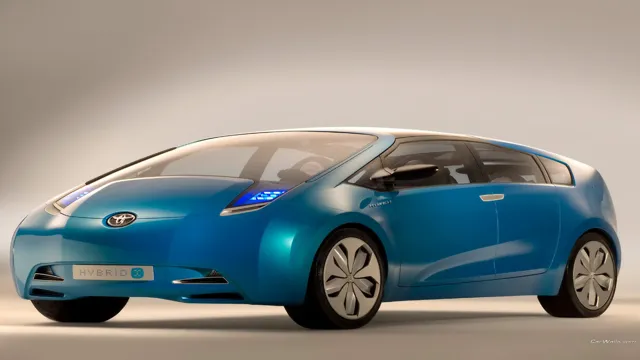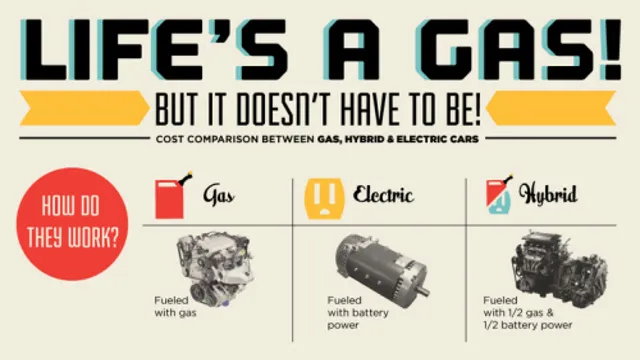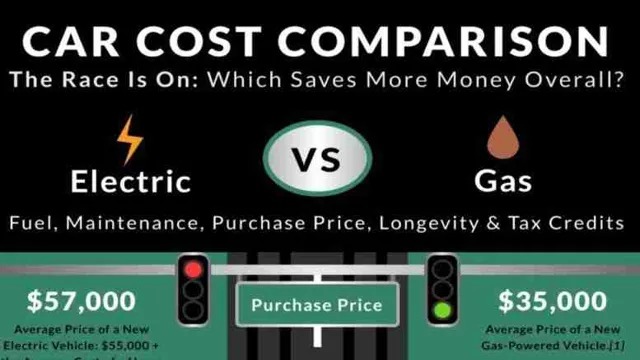The Shocking Truth about Electric Car Maintenance Costs: Your Ultimate Guide
Electric cars are touted as the future of automobiles. They are buzzing with eco-friendliness, low emissions, and high-tech features. But are they worth investing in financially? One of the major concerns that people have is the cost of maintaining an electric car.
After all, these vehicles are a step up from the traditional gasoline-powered cars and can seem intimidating to those who are new to the world of electric vehicles. In this blog post, we will dive into the cost of maintaining an electric car and break down the expenses that come with owning one. So, buckle up and let’s find out if an electric car is worth the investment!
Initial Investment
If you’re thinking of switching to an electric car, you might be wondering how much it would cost to maintain it in the long run. Although the initial investment for an electric car is higher than a gasoline-powered vehicle, you’ll save money in the long run due to lower fuel and maintenance costs. The cost of maintaining an electric car is significantly less than that of a traditional car, as there are fewer moving parts to worry about.
You won’t need oil changes, spark plug replacements, or other engine-related maintenances. Instead, the cost comes down to regular tire rotations, brake pad replacements, and battery replacements after several years of usage. However, these costs are still lower than a traditional car’s maintenance, and the overall cost of ownership will be more affordable.
Additionally, electric cars have a longer lifespan and higher resale value, making them a more sustainable and financially sound investment. So while the initial investment may seem steep, in the long run, an electric car can save you money on both fuel and maintenance costs.
Purchasing an Electric Car vs. Gasoline Car
When it comes to purchasing a car, deciding between an electric and gasoline car can be a tough choice. One significant factor to consider is the initial investment. Electric cars may have a higher price tag upfront due to their advanced technology, specialized batteries, and limited production compared to gasoline cars.
However, electric car owners may be eligible for federal and state tax credits, as well as utility company rebates, which can help offset the cost. Additionally, electric cars may have lower operating costs in the long run, as they require less maintenance and have lower fuel costs. Ultimately, the decision of whether to purchase an electric or gasoline car will depend on individual priorities and budget.

Cost of Charging Stations Installation
If you’re considering installing electric vehicle charging stations, you’re probably wondering about the initial investment. While the cost will vary depending on factors such as the number of stations you want to install and their level of power, you can expect to spend between $3,000 and $7,000 per station. That may seem like a lot of money, but it’s important to look at the bigger picture.
Offering EV charging stations can attract more customers to your business, especially as more people switch to electric vehicles. Plus, as demand for charging stations increases, so will their value. Think of it like installing a gas pump – it may involve a significant upfront cost, but it’s an investment that will pay off in the long run.
Routine Maintenance Costs
When it comes to electric cars, one question on people’s minds is how much does it cost to maintain an electric car? Routine maintenance for an electric vehicle is generally less expensive compared to a gasoline or diesel car. For instance, electric cars use regenerative braking, which reduces wear and tear on brake pads. Additionally, electric motors consist of fewer moving parts, meaning there are fewer components to maintain.
The cost to maintain an electric car can vary depending on the make and model. However, the average cost to maintain an electric car ranges from $300 to $400 a year, which is significantly lower compared to a gasoline car that can cost upwards of $1,000 a year. But, just like with any vehicle, electric cars require regular servicing, such as changing fluids, brakes, tires, and filters, to stay in good condition.
Battery Maintenance and Replacement
When it comes to maintaining your electric vehicle’s battery, routine maintenance is essential. The good news is that the cost of maintaining an electric vehicle’s battery is lower than that of a gasoline-powered vehicle’s engine. However, it’s important to keep in mind that battery replacement costs can be high.
On average, the cost of replacing an electric vehicle battery can range from $3,000 to $7,000, depending on the make and model of the vehicle. This is where routine maintenance comes in handy. By regularly maintaining your battery, you can extend its lifespan and delay the need for a costly replacement.
Some simple maintenance tasks include keeping your battery at a proper temperature, avoiding deep discharges, and avoiding exposure to extreme temperatures or humidity. Overall, while battery replacement costs can be a bit steep, keeping up with routine maintenance can help save you money in the long run.
Tire Rotation and Replacement
Routine maintenance costs can add up over the life of a vehicle, but tire rotation and replacement are crucial to maintaining car safety and performance. Rotating tires helps distribute wear and tear evenly, prolonging the life of the tires and improving overall handling. It’s recommended to rotate tires every 5,000 to 10,000 miles, depending on the manufacturer’s guidelines.
Replacing tires is also important when they start to show signs of wear, such as low tread depth or cracks in the sidewall. Investing in high-quality tires can improve fuel efficiency, reduce road noise, and provide better handling in wet or dry conditions. Plus, by keeping up with tire maintenance, drivers can avoid potential safety hazards on the road.
Overall, routine tire maintenance is a smart investment in both vehicle performance and driver safety.
Brake Maintenance
Brake maintenance is an essential aspect of keeping your vehicle in top condition. Routine maintenance costs can vary, depending on the type of vehicle you have and the level of use it receives. However, performing regular inspections and replacing brake components as needed can help prevent costly repairs down the line.
For example, if you hear a high-pitched screeching sound when you apply the brakes, it may indicate that the brake pads need to be replaced. Neglecting to do so can result in further damage to your braking system, which can lead to expensive repairs. Just like going to the gym regularly can help maintain your body, proper brake maintenance can help ensure the safety and longevity of your vehicle.
So, don’t overlook routine maintenance costs when it comes to your brakes, and be sure to stay on top of any necessary repairs to keep your vehicle running smoothly and safely.
Potential Long-Term Savings
If you’ve ever wondered how much it costs to maintain an electric car, you’ll be pleased to know that it’s generally cheaper in the long-term compared to owning a traditional gas-powered car. While the upfront cost of purchasing an electric vehicle may be higher, the savings in terms of maintenance are substantial. One of the biggest savings comes from the lack of need for oil changes, as electric vehicles don’t use oil.
Additionally, electric cars have fewer parts that require regular maintenance, such as spark plugs and belts. This can lead to less frequent trips to the auto shop and fewer costly repairs over time. Furthermore, electric vehicles have regenerative braking, which means that the electric motor helps slow the car down, which reduces the wear and tear on the brakes.
All of these factors can result in significant savings over the lifetime of an electric car.
Lower Fuel and Maintenance Costs over Time
If you’re trying to save money over the long-term, purchasing a vehicle that is fuel-efficient and easy to maintain could be a great way to do it. By choosing a car that gets good gas mileage, you could potentially save thousands of dollars on fuel costs over the lifetime of your vehicle. Additionally, cars that are easy to maintain and don’t require frequent repairs can help keep your maintenance costs low, further adding to your overall savings.
One option to consider is a hybrid or electric vehicle, as they tend to be both fuel-efficient and require less maintenance than traditional gasoline-powered cars. While the upfront costs of these vehicles may be higher, the potential long-term savings could be worth it. Plus, you’ll also be doing your part to help the environment by reducing your carbon footprint.
So, the next time you’re in the market for a new car, consider the potential long-term savings of a fuel-efficient and low-maintenance vehicle.
Tax Credits and Incentives
Tax credits and incentives can provide a significant boost to your financial savings in the long run. While they may not provide an immediate impact on your bottom line, they can help lower your tax bill and provide extra cash flow to reinvest in your business. Tax credits and incentives vary depending on your location, industry, and business activities.
For instance, companies that invest in research and development may be eligible for federal R&D tax credits, which can cover up to 20% of qualifying expenses. Similarly, state and local tax credits can provide relief for companies that hire employees, invest in capital equipment, or implement energy-efficient solutions. By taking advantage of these credits and incentives, you can maximize your business cash flow and put money back into your pocket.
Plus, these savings can compound over time, leading to significant financial gains and increased competitiveness in your industry. So, if you’re not already exploring tax credits and incentives for your business, it’s time to start investigating what options are available and how they can benefit your long-term financial success.
Conclusion
In conclusion, the cost of maintaining an electric car varies greatly depending on factors such as make and model, driving habits, and charging options. However, one thing is clear: the long-term savings from lower fuel and maintenance costs make electric cars a smart and environmentally-friendly investment. So go ahead, make the switch to electric and let your wallet (and the planet) thank you.
“
FAQs
What is the average cost of maintenance for an electric car?
The average cost of maintenance for an electric car can vary between $500 to $1,000 per year, depending on the make and model.
Do electric cars need less maintenance than traditional cars?
Yes, electric cars generally require less maintenance than traditional cars as they have fewer moving parts and don’t require oil changes.
Are there any specific maintenance tasks that are unique to electric cars?
Yes, electric cars have unique maintenance tasks such as battery management system updates and motor maintenance, which should be performed by a trained technician.
How much does it cost to replace an electric car battery?
The cost to replace an electric car battery can range from $3,000 to $7,000, depending on the make and model of your car. However, most electric car batteries have a warranty for at least 8 years or 100,000 miles.







